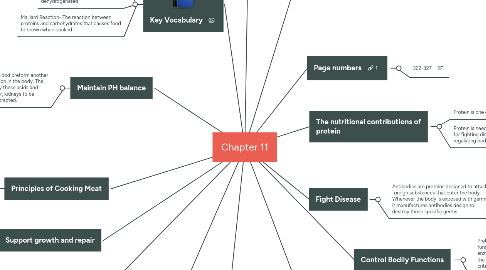Chapter 11
by Juan Munoz


1. Key Vocabulary
1.1. Collagen- A protein in connective tissue
1.2. Aldehyde- An alcohol that has been dehydrogenated
1.3. Maillard Reaction- The reaction between proteins and carbohydrates that causes food to brown when cooked
2. Juan Munoz, Genesis Flores, Anthony Silva
3. Principles of Cooking Meat
3.1. Contains 3 categories of protein: muscle fibers, connective tissue, and myoglobin. Collagen is a protein in connective tissue. The best balance is simmering the roast in 86C or 93C in liquid for at least 3 hours
4. Support growth and repair
4.1. The most important function of protein in the body is to provide nitrogen and amino acids for growth and repair. Protein is used to make muscle fibers, connective tissue, cell walls, and red and white blood cells
5. Maintain Fluid and Mineral Balance
5.1. Another function of proteins in the body is preformed by proteins in cell walls. These proteins help control the movement of water and minerals in and out of the cell.
6. Maintain PH balance
6.1. Proteins in the blood preform another important function in the body. The blood must carry these acids and bases to the liver, kidneys to be processed or extracted.
7. Future Protein Needs
7.1. Researchers predict there will be a food shortage in the future. New sources of food protein must be found if there is to be enough for everyone.
8. Provide bodily functions
8.1. the body does not store extra protein or turn it into muscle. When you consume extra protein that your body needs, the body can change the amino acids into an energy source
9. Page numbers
9.1. 322-327
10. The nutritional contributions of protein
10.1. Protein is one of the energy nutrients.
10.2. Protein is needed to repair of body tissue, for fighting disease, PH balance and regulating body functions.
11. Fight Disease
11.1. Antibodies are proteins designed to attack foreign substances that enter the body. Whenever the body is exposed with germs it manufactures antibodies design to destroy those specific germs.
12. Control Bodily Functions
12.1. Proteins play a role in controlling many bodily functions by being a part of hormones and enzymes. Hormones control growth, regulate the reproductive system, and maintain other critical body functions. Enzymes are a necessary part of most chemical reaction s that occur within the body
13. Health Concerns
13.1. There is allergies nearly to 175 different foods that have been documented. Symptoms can occur within seconds or can also take 72 hours to occur. Symptoms can be very dramatically from one person to another and also one food to the next. Symptoms can also include to hives, itching, tingling, swelling, red and watery eyes, sinus, brainage, edema, swollen, joints, vomiting, diarrhea, coughing, wheezing, dizziness, and anaphylaxis.
14. Asessment Questions
14.1. 1. What is an aldehyde?
14.1.1. 2.Whats the most important function of protein in the body

